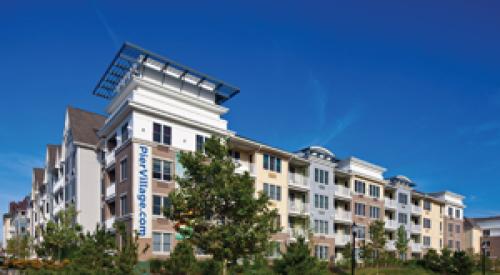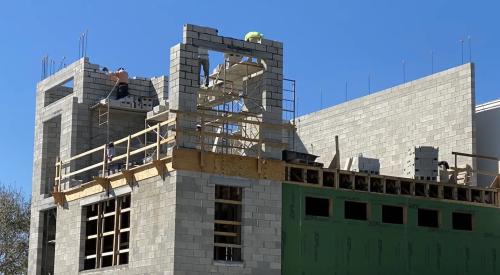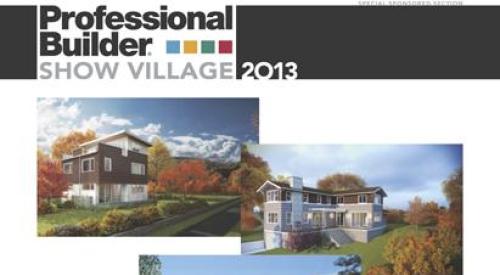|
 |
| NOT YOUR TYPICAL model home. The High Performance Home in K. Hovnanian’s Eagles Pointe community trades elaborate decorations for cutaways and placards that tell about technology. Photo: Paul Deffenbaugh |
Most production builders zero in on their target market — first-timers, empty nesters, move-ups and more — and design, build, market and decorate their product to suit. There's usually a flashy staged model home and a front-and-center pitch from a sales agent about the community.
But in the Eagles Pointe community in Woodbridge, Va., K. Hovnanian's Landover Group built a model that targets everyone — home buyer, real-estate agent, employee, trade partner and beyond — in its latest Building America Concept Home. Referred to as the High Performance Home, the model exceeds the 's Building America energy standards and illustrates the energy-efficiency technology now standard in all the Landover Group's homes. The builder tells High Performance Home buyers they can expect a tight building envelope that's been designed for energy efficiency, a mechanical system that ensures indoor air quality and an overall comfortable, healthy home.
 |
| EVENTS FOR THE PUBLIC and industry audiences have reinforced K. Hovnanian’s image as an energy-efficient builder, managers say. Photo: K. Hovnanian |
In the High Performance Home model on display, you won't find dining room tables with elaborate place settings and perfectly appointed living room furniture. Instead, placards on the walls explain the benefits of spray-foam insulation, cutaways detail an HVAC system and tour guides describe the value of K. Hovnanian's High Performance Home standard.
Bringing a high-performance home concept to market gives a new focus a production builder. But if the trades don't know how to build it, the company executives don't understand it, real-estate agents can't explain it and home buyers don't see the value in a tight building envelope and energy-efficient technology, what good is it? The High Performance Home aims to solve that problem.
Education for all
There's a lot to learn from the High Performance Home, and everyone's in on the lesson.
Management
Chris Payne, the Landover Group's purchasing manager, and Chip Merlin, the vice president of operations for the Landover Group, knew that to make the High Performance Home a success they had to get buy-in from the top down. So they got in front of the Landover Group's senior management — the vice presidents in charge of everything from marketing to construction — to educated them on building technology and reinforce the High Performance Home's importance to the builder's branding and mission.
Employees
 |
 |
 |
The concept home has also become a tool for employee training. All employees — not just the sales team — learn about everything: architectural strategy, product SKU rationalization, why they call "high performance," what the customer gets from a High Performance Home and more.
Trade partners
Training the trades on high-performance home products' installation and technologies is one of the big advantages, Payne and Merlin agree. Training takes place monthly and often first-hand from product manufacturers. Getting trades to buy in to the High Performance Home idea has gone well. "We feel it's a necessity," says Merlin. "... We need to build better homes so we have less service demand, so all our costs are more predictable and we build in the value up front to the customer."
Real-estate agents, HBAs and more
Real-estate agents and others in the building industry have toured the High Performance Home, which not only educates them on building technology but positions the builder as at the forefront of energy-efficient building. They learn about the home from the home buyer's perspective as well as the builder's perspective.
Prospective buyers
Prospective home buyers who tour the home learn what energy efficiency means and the High Performance Home standard K. Hovnanian has been using in its homes since January. "Today the customer is demanding more, and they can also shop you on price," says Merlin. "We've got the ability to talk about something of value to them."
The tour guide describes in easy-to-understand language the energy-efficient technology that goes into everything from the walls to the windows. Handouts mimic the simple language, and not by coincidence. "We explain that we've been thoughtful about the selection of partners and products. We've viewed a lot of demonstration homes, and what we've seen to be the most effective is massaging that's simplest," says Merlin. "Most people do not really need to know a great deal of technical data; they want to feel confident the builder is making the right decision on their behalf."
Tactile displays are key to the model's success as an educational tool, say Payne and Merlin. A mock high-performance home cutaway that stands about 4 feet by 6 feet by 9 feet, for example (see photo in sidebar, this page), offers an inside-out view of the foundation, first floor, second floor and all the systems — it even includes faux housewrap. The display is so successful the company built 25 smaller
| Home buyers leave the model with product literature (above) on technologies they learned about during the tour. |
models for each of the Landover Group's sales centers, which is helpful, says Payne, because the model homes were built before the High Performance Home standard was adopted.
Adds Merlin: "This really put a stake in the ground for what the High Performance Home in the Mid-Atlantic area is all about."
When you've got a story to tell, you want the right audience. In this case, the four-bedroom, 3½ bathroom concept home's target market is "everyone," says Chris Payne, the Landover Group's purchasing manager. "Whether you're buying a townhome or a luxury home in the $900,000s with us, you're getting a high-performance home, so this is education for everyone on what you get."
The location isn't coincidental: The Eagles Pointe community — one of the Landover Group's most successful — sits within a high-growth corridor not far from Washington, D.C., and near some of the builder's other communities.
Traffic is solid. Payne equates visiting the development to going to the Auto Show: you can come and see not only new product but product of the future.
VIDEO: On-Site at the High Performance Home
Listen and watch as Chris Payne describes how the High Performance Home works:
Video: The High Performance Home Demonstration Cutaway
Video: Infrared Testing Results of the High Performance Home
Video: The Systems the High Performance Home Tests
Since January, all the Landover Group's homes have met its High Performance Home standard, which means the home is specifically designed to control the temperature of the thermal envelope; manage and minimize air and water leaks; and regulate the heating and cooling of the home so it's energy efficient. The builder boasts that the 2,800-square-foot home has an estimated savings of more than $1,600 a year compared to a home built in the late '90s. One of the main goals of building high-performance homes is to continually evaluate new products and systems so the builder can deliver the latest technology and best energy efficiency, says Chip Merlin, the vice president of operations for the Landover Group. Adds Purchasing Manager Chris Payne: "Our materials have evolved significantly over the past couple years as a result of this program."
"[Being a part of the Building America program] has allowed us to have a discussion that focuses purely on increasing the level of performance of a home and have no other agenda," says Merlin. |
||||
|
K. Hovnanian adopted several new technologies in the Landover Group's High Performance Home:
"We've gotten more comfortable internally with exploring design alternatives because of this program and are more open to try different products and solutions," says Chip Merlin, the vice president of operations for the Landover Group. The division is "kicking around" the idea of a High Performance Plus Home that would include more advanced building envelope strategies.
|
















